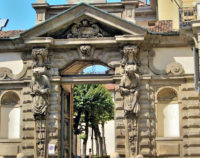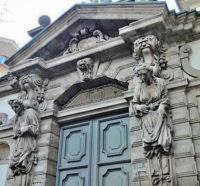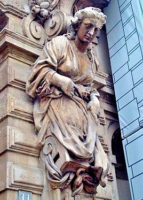11 Corso Venezia
Milano
Lombardia
20121
IT
At No. 11 Corso Venezia we can see the building which was once the “Seminario Maggiore” founded by St. Carlo in 1561, this buildings built on the site of the ancient “Umiliati” monastery’, which is, at the moment, being restored to be used as a centre for eccliastical studies.
The monumental entrance, adorned with two colossal caryatids, and dominated by St. Carlo’s coat-of-arms, was designed by F.M. Richini in 1652. The interior of the building has a courtyard with a colonnade and two superimposed porticos, architraves with granite columns which recall a certain palladian influence.
0.09 km
Illustrations and paintings recall the historical events of the city from the 17th to the early years of the 20th century. ...
0.1 km
The correct name would be Palazzo Morando Attendolo Bolognim. It now contains a municipal museum collection. The Barocchetto style facade has been partly remodeled. The staircas...
0.13 km
This linear and unadorned façade makes it a typical example of 15th century Milanese architecture. There is a wrought iron balcony on the exterior above the main door which is d...
0.16 km
The basilica ol San Babila, now squashed in by modern buildings, was, perhaps, built at the end of the Xlth century on the site of another, but older, church founded by St. Lore...
0.17 km
Via Monte Napoleone is synonymous with opulence, elegance, and the finest in fashion. Nestled in the heart of Milan, this prestigious street is a hub for high-end shopping and d...
0.22 km
The present day basilica of St. Carlo was built on the site of the old church and convent ol the Servants of Mary. When preparations for Ferdinando I of Austria’s entrance into ...
0.22 km
This large and majestic building was enlarged in the Neoclassical style by Simone Cantoni at the end of the 18th century. The façade has three orders, or rows, of windows that h...
0.24 km
Fabio Mangone, the master builder of the Duomo and favorite arch tect of Cardinal Federico Borromeo began to construct this austere edifice in 1620. It was intended to house the...
0.37 km
Piermarini constructed this palace for the princes, Antonio and Alberico Barbiano of Belgioioso between the years 1772 and 1781. The façade has three stories of twenty-five wind...
0.4 km
This 17th century mansion is the dwelling of the famous orchestra conductor s family. On the outside is a superb wrought iron railing on the central balcony The larghe front doo...
0.4 km
Welcome to the world of Alessandro Manzoni, a prominent Italian author, poet, and playwright. His house in Milan, known as Casa di Manzoni, has been transformed into a museum th...
0.42 km
The “House of the Omenoni” was built by Leone Leoni and is one of the most interesting late sixteenth century buildings in Milan. It has eight caryatids called “Omen...
0.46 km
+39 02 79 4889/6334+39 02 79 4889/6334
The apartment in Via Manzoni No. 12 in which the Poldi Pezzoli Museum is housed, was destined to become a museum bv a member of a noble family, Gian Giacomo Poldi Pezzoli in 187...
0.48 km
Styles called “floreale” and “Liberty” were fashionable at the beginning of 20th century. They were typified by heavy ornamentation of figures, columns, ...
0.51 km
The oldest part, named after a family that owned it, was built in the 15th century. However, it has been considerably altered during the course of the centuries that have follow...
0.52 km
This building is commonly called the ’’Royal Villa” but it was built by the Viennese architecht Leopold Poliak in 1790 as the home of Count Lodovico Barbiano di Belgioioso...
0.55 km
This was built between 1553 and 1558 by Galeazzo Alessi for the Genoese merchant. Tommaso Marino The courtyard walls and columns are richly adorned with modeled concrete heads, ...
0.57 km
St. Maria Della Passione’s Church rises between Via Conservatorio and Via V. Beilini. It was built by oder of Domenico Birago, Prothonotary Apostolical, appointed by Sisto IV as...
0.58 km
Here is another example, like Palazzo Serbelloni, of the grandiose Neoclassical style of architecture that was in vogue during the Napoleonic Era. It is the work of the early 18...
The building with severe lines stands on one side of the Piazza della Scala. In the center of the square is the monument to Leonardo da Vinci by the sculptor Pietro Magni (1872)...


























